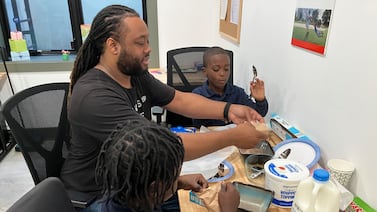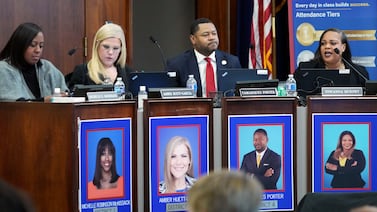Stay up-to-date on the latest news in early childhood education and development across the U.S. Sign up for Chalkbeat’s free monthly newsletter The Starting Line.
Colorado leaders want to boost enrollment in the state’s already popular universal preschool program, mint more highly rated child care programs, and create more seats for infants and toddlers — the age group hit hardest by child care shortages.
These are a few of the Colorado Department of Early Childhood’s five “wildly important goals,” which spell out specific gains for young children the state hopes to achieve over one to three years. They are among 71 wildly important goals across 20 state agencies. Together, they reflect some of the state’s biggest public policy priorities.
Here’s a look at three of the early childhood department’s goals and the progress toward each one halfway through the state’s fiscal year.
Universal preschool enrollment
Goal: 72.7% of Colorado 4-year-olds will enroll this year, up from 69.2% last year.
Progress: 64.5% of 4-year-olds were enrolled as of Oct. 31.
It’s unclear if Colorado will meet its goal of getting nearly 73% of the state’s 64,000 4-year-olds into state-funded preschool this year. By the end of October, just over 41,000 4-year-olds were enrolled, about 2,400 less than last year’s total. Still, it’s likely additional children will join the program over the next five months.
Universal preschool is one of Gov. Jared Polis’ signature priorities and has been popular since its launch in the fall of 2023. It provides 15 hours a week of tuition-free preschool to most children, with some getting 10 hours and some getting 30 hours a week.
Some experts don’t consider preschool to be “universal” until at least 70% of eligible children participate. If Colorado meets its wildly important preschool goal, it would easily enter that exclusive club. Only Washington, D.C., surpassed the 70% threshold for publicly funded preschool enrollment in 2022-23, the most recent data available from the National Institute For Early Education Research, which puts out an annual state-by-state preschool report.
Six states enrolled more than 60% of eligible 4-year-olds in state-funded preschool during 2022-23. They are Florida, Oklahoma, West Virginia, Iowa, Vermont, and Wisconsin. By contrast, Colorado only enrolled 24% of 4-year-olds in state-funded preschool that year, the last year the state ran a free preschool program focused on children from low-income families or those with other risk factors.
Child care ratings
Goal: 1,215 programs will have one of the state’s top three ratings, up from 1,093 last year.
Progress: 1,133 programs had one of the top 3 ratings as of Dec. 1.
Colorado is a bit behind on this goal, having gotten only one-third of the way there so far. That lagging progress reflects a bigger issue at play: the state’s ongoing struggle to get large numbers of child care providers to climb the ratings ladder. It’s been a challenge since Colorado Shines, the state’s five-level child care ratings system, launched a decade ago. Programs automatically earn a Level 1 rating when they get a state child care license, which means they meet basic health and safety standards. But there’s no requirement to move higher.
The state has pumped lots of money into incentives for providers to earn a Level 3, 4, or 5, all of which require an in-person evaluation and indicate a program is high quality. Still, some providers say the process is too stressful and time-consuming. Others have full classrooms already and don’t feel higher ratings will make much difference.
But experts say high-quality child care is a must if children are to realize the social and education benefits top notch programs generate. Today, about 32% of Colorado’s 3,600 child care providers have one the top 3 ratings, up from 25% five years ago.
Child care for infant and toddlers
Goal: 39,953 licensed seats for infants and toddlers, up from 38,416 last year.
Progress: 39,264 licensed seats for infants and toddlers as of Dec. 1.
Halfway through the fiscal year, Colorado is more than halfway to this goal, having added about 850 seats for children under age 3. Like most states, Colorado desperately needs more child care for infants and toddlers. Currently, the state has only enough licensed child care seats for about 20% of the 191,000 kids in this age group. But far more of them have working parents and need at least some child care. That’s why creating more licensed seats over three years — for a total of nearly 40,000 by this June and more than 43,000 by June 2027 — is a key early childhood goal.
In recent years, state leaders have been working to address this pain point in various ways — for example, offering COVID relief grants to child care programs that create more infant and toddler spots and giving bonuses to new home-based child care programs, which often serve this age group. Local governments, philanthropists, and large employers, including hospitals, ski resorts, and the Denver airport, have also taken action.
But the fact is, basic economics makes this goal an uphill battle. That’s because infant and toddler care is the most expensive kind of care to provide. In contrast, preschool, where one teacher can supervise double the number of children, is far cheaper.
Ann Schimke is a senior reporter at Chalkbeat, covering early childhood issues and early literacy. Contact Ann at aschimke@chalkbeat.org.






